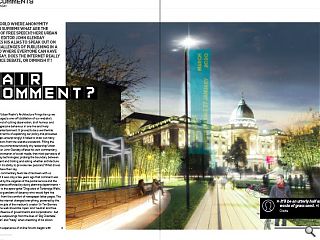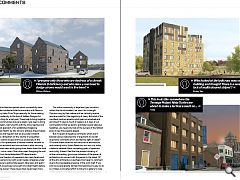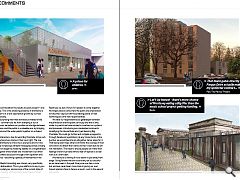UR: Fair Comment?
23 Oct 2017
In a world where anonymity reigns supreme what are the limits of free speech? Here Urban Realm editor John Glenday ditches his alias to speak out on the challenges of publishing in a world where everyone can have their say. Does the internet really enhance debate, or diminish it?
As part of Urban Realm’s Architecture Fringe tie-up we recently staged a one-off distillation of our website’s unique blend of cutting observation, droll humour and passive aggressive behaviour in one live and lively evening’s entertainment. It proved to be a worthwhile endeavor in terms of explaining our policy and processes but (perhaps unsurprisingly) it failed to draw out many commentators from the website woodwork. Filling the silence of the uncharacteristically shy readership Urban Realm editor John Glenday offered his own commentary on the phenomenon of social media, that most pervasive of modern day technologies; probing the boundary between fair comment and trolling and asking whether architecture is unique in its ability to provoke raw passions?What drives people to have their say. Online commentary feels like it has been with us forever but it was only a few years ago that comment was constrained by the vagaries of the postal service and the limited audience aff orded by dusty planning departments – giving rise to the apocryphal ‘Disgusted of Tunbridge Wells’, anonymous guardians of decency who would fight the good fight from the comfort of newspaper letter pages. The arrival of the internet changed everything, powered by the guiding principle of the medium’s creator Sir Tim Berners Lee, that the web should be ‘open’ and ‘neutral’ and free from the influence of governments and corporations - but did he have outpourings from the likes of ‘Big Chantelle’, ‘Boaby Wan’ and ‘Yaldy’ when dreaming of his silicon nirvana? My own experience of online forums began with specialised architecture portals which successfully drew together like-minded architecture anoraks, with flavours to suit every taste. From Skyscrapercity for those seeking thrusting modernity to the likes of Hidden Glasgow for those searching for a lost past. These help to bring together scattered communities and were assets I was keen to bring to Urban Realm, marrying this with the more rigorous and professional approach of an established magazine. At Urban Realm we also strive to embody the principles of openness and freedom but we are under constant pressure to clampdown on the volume of unqualified comment, restrict access and focus exclusively on the profession.
As a publication of record however we seek to reach out to architects and non-architects alike, securing big name interviews while giving those lower down the food chain their voice– even if that does mean foregoing the odd exclusive from discombobulated PR departments. Of course freedom of expression has many facets and countless opinions but with social media companies under huge pressure to police hate speech, fake news and spam – all of which are actively removed from Urban Realm before ever lighting a pixel - these issues have never been more salient for the general public or publishers.
Our online community is large and (yes) vocal but rather than be intimidated, we view it as a strength. Opinions vary by their nature and we certainly receive (and are noted for) the negativity of many. But what of the countless positive remarks which pass unremarked and unnoticed? It says as much of readers as it does of our commentators that we tend to gravitate toward salacious headlines, you need only look at the success of the tabloid press to see this populist appeal. But if we ban all negative comments which aren’t backed up by a reasoned line of argument do we ban all positive comments which are likewise light on detail? Of course these issues are not exclusive to architecture and certainly not to Urban Realm but our aim is to strike a balance between these competing goals of openness and civility. Indeed I feel that the present vibrancy of online commentary give some indication of the power of architecture to connect with the person in the street. Of all the arts architecture is perhaps most open to comment due to the inescapable presence of the work itself. If you wish to avoid a ghastly Damian Hirst painting it’s easy to do so. It takes a concerted effort to travel to a gallery to view it. For someone troubled by a new block of flats, hotel or student accommodation the results are ever present – and in your face. This is the enduring presence of architecture and reaction to it is lent exponential growth by our fast digitizing society. It is unsurprising then that architecture makes fertile ground for comment but far from stamping it out or cracking down we believe our position as a bridge between the profession and the public is a valuable one, by bringing professionals and the wider public together on a shared platform. Some characters, step forward Big Chantelle, strike such a cord they become a meme in their own right.
The Joe Bloggs of architecture critics she is everyone and no-one and yet the increasingly strident messaging carries a twang of truth which began by fostering debate on a singlehanded crusade against white render and ‘modernism’ but which ultimately stifled discussion through overt repetition and intransigence - becoming a parody of themselves in the process. Urban Realm’s branding was chosen very specifically for the UR abbreviation. This is your platform to say in your own words what your opinions are of the current state of play in the industry. UR Comments wasn’t about Urban Realm per se, but a forum for readers to come together. No longer passive consumers the public are empowered to have their say but with the enabling power of new technologies come new responsibilities. We take our responsibilities as gatekeeper between the profession and the public seriously and that is why under my watch we have worked to overhaul our systems and processes; introducing pre-moderated comments, simplifying the House Rules and (yes) banning Big Chantelle. We could go further and instigate a paywall or through Facebook registration nip any future furore in the bud but we would become an altogether tamer place for it. That being said I hope others will follow the courage of their convictions to attach their names to their views but we will not mandate it.
The need to ensure people can make their feelings known in private without fear of reprisal is as real now as it’s ever been. Architecture is nothing if not a desire to pull away from beige. Going forward we aim to be every bit as colourful as we have been in the past. Everyone now has a voice but we have never been more mute in giving our own honest opinions face to face as a result - such is the ease of anonymity.
|
|
Read next: Engineering Survey: Building Better
Read previous: Architecture Fringe: Bad Press
Back to October 2017
Browse Features Archive
Search
News
For more news from the industry visit our News section.
Features & Reports
For more information from the industry visit our Features & Reports section.





